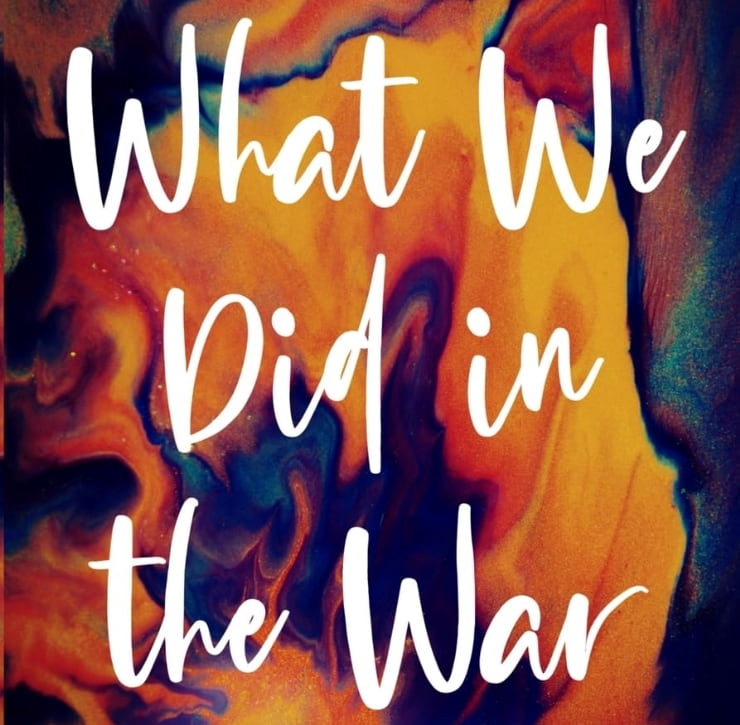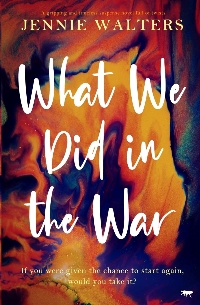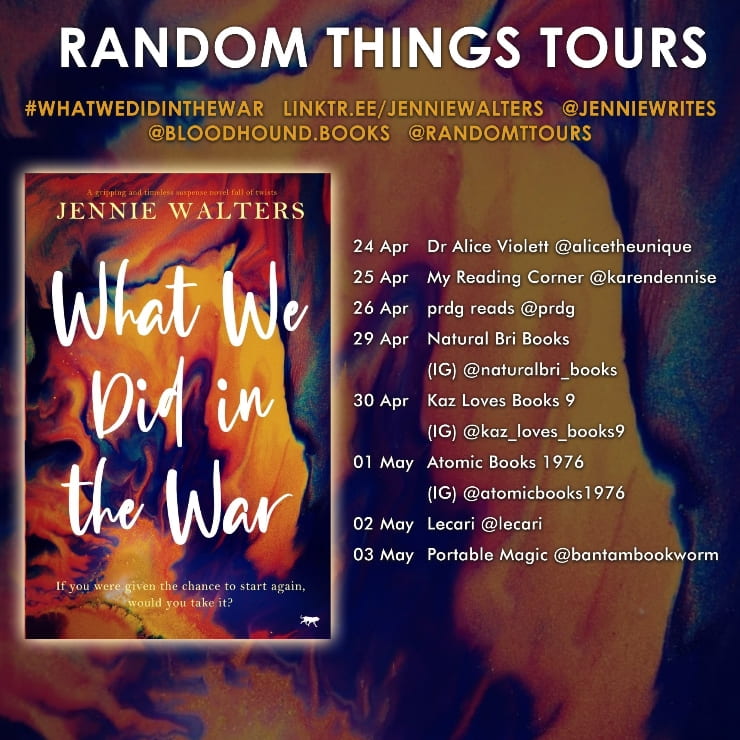Blog tour: What We Did in the War by Jennie Walters

This post is part of a blog tour organised by Random Things Blog Tours. I received a free copy of the book in return for an honest review.
‘London, 1944: As bombs start raining from the sky, two women rush out of a restaurant, leaving their possessions behind.
‘Their chance meeting amid the chaos and destruction will have long-lasting consequences. Both beset by desperate problems, they take advantage of the wartime chaos to escape their humdrum lives and start again.
‘Sticking together, the pair live under the radar, using a stolen ration book to feed themselves and relying on a street kid’s help to get by. Cecil eventually finds work, while glamorous, feckless Claude looks after the flat – or doesn’t. Gradually their friendship sours and resentment creeps in.
‘Just as Cecil is wondering whether she should ever have trusted Claude in the first place, she makes a shocking discovery – one that will expose a web of secrets, lead to an act of violence, and set the two on separate and very different paths.’

In What We Did in the War, by Jennie Walters, two young women – Cecil and Claude (aka Fabia and Stella, or Mary and Pamela!) – find themselves together after narrowly escaping a doodlebug attack.
With their own handbags buried in the rubble, and in possession of the purse of another woman who wasn’t so lucky, they take the opportunity to assume new identities and escape their respective problems.
However, as the weeks go by, it becomes apparent not only that they have totally incompatible personalities and goals, but that each is hiding important information from the other. We know from the outset that tensions are going to reach boiling point – but when, and how?
I very much enjoyed What We Did in the War. Walters’ clear, concise prose, and the constant tension as you wait for the other shoe to drop, make it a pacey read that left me sufficient bandwidth to really think about the ins and outs of the two main characters.
And they gave me so much to think about! I was constantly adjusting my opinion of Cecil. I started off feeling sorry for her, then came to see her as kind of a party pooper and a bit up herself, then (without giving too much away) the extent to which she was an unreliable narrator was revealed and I became conflicted.
By the end of the book (by which point several years have passed), I found Cecil unhealthily – albeit compellingly – obsessive and self-aggrandising. She goes to disturbing lengths to reconnect with Claude in order to coax some expression of gratefulness and/or apology from her former friend, while failing to appreciate what she herself has achieved despite those whirlwind few months in 1944.
As for Claude, it’s hard to know what to think, as my impressions of her character are so heavily filtered through Cecil as the strong-voiced narrator. On the one hand, maybe Claude could be a bit more proactive, and be kinder to, and more honest with Cecil.
On the other, she’s not obliged to prostrate herself with thankfulness to Cecil – as Cecil clearly wants her to – for giving her consideration she didn’t actually ask for. It’s also arguable that some of Claude’s behaviour is mitigated by her personal situation, and that she could never live up to Cecil’s standards and expectations, which are high to begin with and inflated by the chance, dramatic nature of their meeting.
I was ultimately left with the question: do Cecil and Claude, respectively, come down more on the side of victim (in terms of both personal circumstances and a patriarchal society) or villain? It’s something I’m still grappling with (it’s complicated…), so this novel is sure to provoke some lively discussions if taken up by book clubs.
One thing that brings out the best in both of their characters, though, is resourceful ten-year-old waif Floss, who helps them to live under the radar. Both Cecil and Claude take Floss under their wings in their own ways, and she becomes a companion they treat as an equal. There were many times when I thought Cecil just wanted to be lauded as a good person while her true thoughts were far from selfless or kind, but her affection for Floss does come across as genuine.
I also liked how effectively the author captures the mood and way of life in London towards the end of WWII. While confident of victory in the wake of D-Day, everyone’s grieving someone, and beyond fed up of shortages and disruption. Meanwhile, the continuation of, and innovation in bombing means there’s still an elevated possibility that a person with hopes and dreams can be there one moment and gone the next.
Accordingly, circumstances are ripe for people (not just Claude and Cecil) to form intense (but often ill-advised and/or transient) relationships based on being in the same place – where one or both otherwise wouldn’t have been – at the same time, or take advantage of the confusion. Incorporating a number of secondary characters, Walters explores some other ways these extraordinary circumstances could manifest, and the emotional and longer-term consequences.
What We Did in the War is tense and gripping, with engagingly complex characters.
